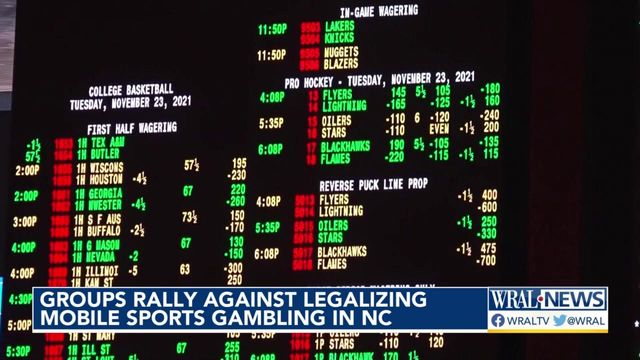'A disaster': Opponents push to stop North Carolina's sports betting bill
As North Carolina lawmakers prepare to vote to legalize mobile sports betting, critics point to a raft of problems they say the state is inviting with legalization.
Posted — UpdatedKids swapping bets the way they once traded baseball cards. A sharp rise in personal financial trouble, and a sharp decline in middle class wealth. And a state filled with regret over its allowance of mobile sports gambling.
Those are some of the arguments opponents of legalization are hoping can sway North Carolina lawmakers ahead of Tuesday's expected vote on the legalization of sports wagering on electronic devices.
"If people understand what's at stake on this, this bill could fail," said Les Bernal, the national director for Stop Predatory Gambling. "It should fail because it has no merit."
"If you legalize online sports gambling, you are unleashing an epidemic of child gambling across the state," Bernal said, citing conversations with middle school and high school principals. "That's what we've seen in state after state. It normalizes gambling for kids."
Proponents have defeated a host of hostile amendments in committees so far in the process. The House rules committee will consider the bill at 11:30 a.m. Tuesday with a vote expected in the full House in the afternoon. A second vote in the House, required because the bill involves revenue, is expected Wednesday.
"This bill is going to invite just a massive expansion of legalized gambling in North Carolina," said John Rustin, president of the North Carolina Family Policy Council. "It will prey on the citizens of North Carolina to generate money for the state. The state share of what that will be in comparison to our overall state budget will be minimal."
North Carolina allows sports wagering in person at three tribal casinos in the state. But the legislation would allow adults physically located in the state to place wagers from their phones at anytime via a licensed operators' app or website.
About half of the states either have mobile sports betting or are in the process of implementing it. Some lawmakers in other states have expressed disappointment and some states have tweaked their regulations, tax rates and/or tax policies surrounding sports gambling.
"It's been a disaster in most of the states that have done it and they certainly haven't done much to protect the public interest or the consumer interest," said Rep. Pricey Harrison, a Guilford County Democrat and critic of the legislation.
Unlike in some other states, North Carolina lawmakers have not made outlandish claims about the amount of revenue they expect to be generated from sports gambling. Gov. Roy Cooper, a supporter, included $85 million from sports gambling in his two-year budget plan, which would cover the first 18 months of legalization.
Republican state legislative leaders have agreed to a spending limit of $29.7 billion for the fiscal year that begins in July.
"There's [revenue] leakage into other states with Virginia, with Tennessee," said Rep. Jason Saine, a Lincoln County Republican and chief sponsor of the bill. "I don't know that we're preventing anything from happening. It's just which market are they going to bet in?"
Mobile sports betting is legal in Virginia and Tennessee. Virginia generated $20.3 million from its 15% tax on adjusted gross revenues in 2021 and $49.8 million in 2022. Tennessee generated $39.3 million in 2021 and $68 million in 2022 from its 20% privilege tax.
North Carolina's proposed privilege tax is 14%.
"We desert our values for money," said Rep. Abe Jones, a Wake County Democrat. "What a shame. What a darn shame."
It is not money gained by the state, but money lost by its citizens that Bernal chose to highlight in his presentation to lawmakers. He said state data shows that the revenue and two Cherokee casinos cost people $2.15 billion in the last fiscal year and projected to be $11 billion over five years even without sports betting.
"You pay even if you don't play," Bernal said. "You end up paying higher taxes over the long term for less services. ... This $11 billion of lost wealth that's going to happen over the next five years, who do you think pays for their health care and their housing and their food stamps and so on?
"We're supposed to be expanding the middle class. Instead we're shrinking the middle class by these extreme forms of predatory gambling sanctioned by state government."
Bernal said there is no grassroots movement to bring sports betting to North Carolina, but instead gambling operators are pushing it.
"If you don't think there's sports betting going on in North Carolina, you're living under a rock," Carolina Hurricanes general manager Don Waddell said. "The state's not getting any revenue from it and no control. We could solve all that."
But critics contend that's a poor trade for potential societal ills that come with more gambling. And they have no doubt there will be more gambling in a legalized environment.
"It's inevitable that the more that gambling is legalized, the more that it is advertised, the more citizens are going to gamble," Rustin said.
Keith Whyte, executive director of the National Council on Problem Gambling, said his organization estimates a 30% increase in the risk for gambling problems nationally between 2018 and 2021 with young, male online sports gamblers making up the majority of the increase. A 2018 U.S. Supreme Court decision opened the door for most states to legalize sports gambling.
"Increases in crime, theft, embezzlement, job loss. In the home, divorce, child abuse, substance abuse and even suicide," Rustin said. "Those are the inevitable consequences of pathological and problem gaming, of gambling addiction. That is where our underlying concern, our fundamental concern about this legislation comes from. ... We are very hopeful and very prayerful, frankly, that enough lawmakers will stand up against this effort."
• Credits
Copyright 2024 by Capitol Broadcasting Company. All rights reserved. This material may not be published, broadcast, rewritten or redistributed.






